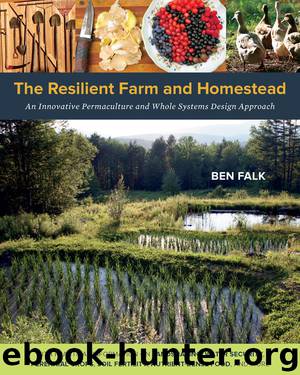The Resilient Farm and Homestead by Ben Falk

Author:Ben Falk [Falk, Ben]
Language: eng
Format: epub
Publisher: Chelsea Green Publishing
Published: 2013-10-10T21:00:00+00:00
Leach Field Cropping: Making the Most of a Faulty System
Leach fields can be some of the most productive spaces on a property—they don’t lack for nutrients!
Cycling fertility optimally on-site entails that we scavenge all possible sources of organic matter and fertility with an eye particularly focused on the lowest hanging fruit. Where are the easiest, most practical sources of fertility? Cycling existing nutrients that are now “lost” or underutilized is the most effective starting point. Luckily, such nutrients are literally in the front yard. Since “plugging the leaks” is usually the most effective starting point for optimizing a system, ensuring that all fertility loops within a site are closed (cycled and not lost) is a good place to start. Landfilling food scraps, cardboard, and other organic matter; tossing animal manures over the bank; and other ways by which people discard potentially valuable nutrients represent leaks in the would-be soil-building system. Plugging such leaks requires cycling nutrients on-site and turning waste into food and is the foundation for a viable and effective soil-building system.
Obvious nutrient sources are well known and utilized by many, from food scraps to garden residues (plant parts, immature fruits, and so on), lawn clippings, leaves, and other yard debris. All of these should be turned back into soil, of course, as quickly and thoroughly as possible via composting or by feeding animals. There are, however, other sources of fertility often overlooked on the homestead site, the most potent of which are the nutrients we ourselves emit on a daily basis. Human effluent can be captured by a composting toilet or humanure system, in a urine watering can, or, most commonly, by an in-ground septic system.
Aside from solid waste and heating, a typical septic system represents the greatest loss of energy and nutrients from a typical homestead. Modern septic systems are the product of well-meaning regulation gone awry. A high proportion of septic systems don’t function as they are intended to, because of clogged main lines, and operate for decades in a seemingly functional state while varying amounts of untreated wastewater leak into the local watershed. If you can smell your leach field at any time across the year, it’s leaking untreated black water, most likely into the nearest river. Leach is what these systems were designed for, and leach they do, silently seeping valuable nutrients and water away from the site and into the watershed, where they do only harm.
Even when septic systems function as intended, they are grossly unsustainable, consuming priceless nutrients and water while producing nothing valuable on the other end. They prop up bureaucracy and industries from petroleum to plastics while simultaneously leaching value from the home economy as the People pay Industry to take our fertility from us. Indeed, the modern septic system and leach field perpetuates an anemic citizenry and empire.
Recapturing much of the concentrated nutrients and water from the home septic system simply involves growing plants in the leach field, which can be harvested, composted, and returned to the soil as fertilizer.
Download
This site does not store any files on its server. We only index and link to content provided by other sites. Please contact the content providers to delete copyright contents if any and email us, we'll remove relevant links or contents immediately.
Turbulence by E. J. Noyes(8040)
The Thirst by Nesbo Jo(6924)
Gerald's Game by Stephen King(4639)
Be in a Treehouse by Pete Nelson(4032)
Marijuana Grower's Handbook by Ed Rosenthal(3675)
The Sprouting Book by Ann Wigmore(3583)
The Red Files by Lee Winter(3411)
The Remains of the Day by Kazuo Ishiguro(3389)
Sharp Objects: A Novel by Gillian Flynn(3004)
Organic Mushroom Farming and Mycoremediation by Tradd Cotter(2684)
Christian (The Protectors Book 1) by L. Ann Marie(2680)
The Culinary Herbal by Susan Belsinger(2477)
Stone Building by Kevin Gardner(2389)
The Starter Garden Handbook by Alice Mary Alvrez(2331)
Lilac Girls by Martha Hall Kelly(2298)
The Unlikely Pilgrimage of Harold Fry by Rachel Joyce(2262)
The Lean Farm Guide to Growing Vegetables: More In-Depth Lean Techniques for Efficient Organic Production by Ben Hartman(2125)
Urban Farming by Thomas Fox(2099)
Backyard Woodland by Josh VanBrakle(1924)
